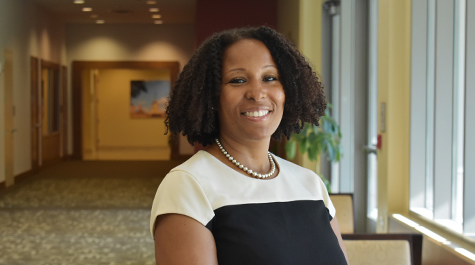Academic parents flourish with family-friendly policies
The pressures of doctoral work and tenure-track professorial work can lead women to feel they must choose between their career and being a mother, said Haskins, who said she has felt at times early in her career that her identity as a mother was not welcome in a professional academic environment. Research bears out her experience, showing that women may achieve tenure later than men in part because of the demands of mothering.
“For many being a mother in the Academy is a marginalizing identity. We wanted to bring awareness that people are dealing with a lot of challenges,” she said. Haskins and colleagues surveyed 107 women who are both counselor educators and mothers about their experiences in higher education. The survey included items from the Occupational Satisfaction in Higher Education Scale-Revised and the Work-Family Enrichment Scale. “The question sometimes becomes, can you be a serious scholar and a mother at the same time?” she said. “You and people around you may be implicitly questioning your competence and your ability because you are a mother. We wanted to find out what women were experiencing.”
While some women feel they cannot talk about mothering during their academic work day, Haskins said other women may postpone having children because they fear mothering will delay career milestones such as achieving tenure – only to feel regret when they find it difficult or impossible to conceive or to have as many children as desired because of age.
Haskins pointed out that institutions and colleagues can create an environment that supports parenting, rather than silences it, simply by adjusting scheduled meetings so that they occur during the day or by providing flexibility when parents need to bring a child to work temporarily.
The article outlines the challenges mothers face in academia – and also highlights some of the dynamic benefits for counselor educator mothers. Women who are both faculty and mothers have reported finding enjoyment in both roles, maintaining a greater sense of work-life balance, and finding that each role can provide relief from the stress of the other.
“We talked about the mothering pedagogy that you brought into your classroom, your experiences from that perspective. Being a mother creates more of a richness in how you deliver course content. Students find mothers more relatable in some ways. From the women we talked to, they felt a connection to their students, especially nontraditional students,” said Haskins, whose previous research has also suggested that counselor education training improves mothering skills. “I am challenging the notion that you have to give up your life for the job. Instead, we need to create an environment where people feel like it is ok to be a mother and a scholar. We can still be productive and contribute.”
Haskins’s interest in the wellbeing of women at work goes beyond research. She and her graduate assistant, doctoral student Laura Pignato, are developing an online affinity group to provide a place for African-American women in academia to find support. This effort is based on the affinity group she ran during her own doctoral program at the University of Georgia.
“That first group was really for African-American women to have a space to share their challenges, share their successes, and feel as if they weren’t being judged because of their identity as a woman and an African-American,” she said, adding that in her experience the support group enabled members to more aggressively pursue their academic careers. Her vision is to work with Pignato to create an online version of the affinity group which will provide mentoring and support to other African-American women. The affinity project is in its early stages, and Haskins hopes it will ultimately provide the kind of enrichment and support that could help women, whether they are mothers or not, flourish in the academic environment.
